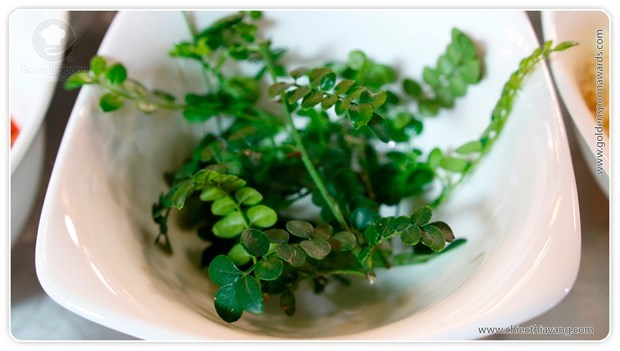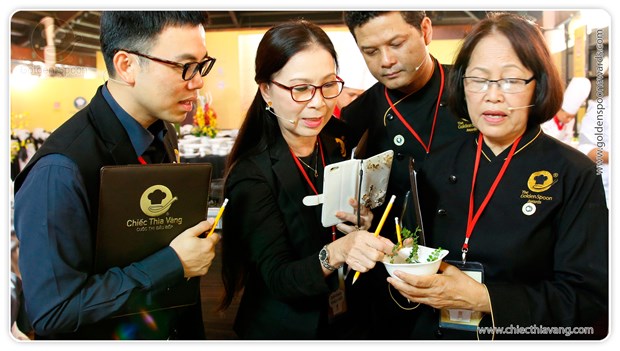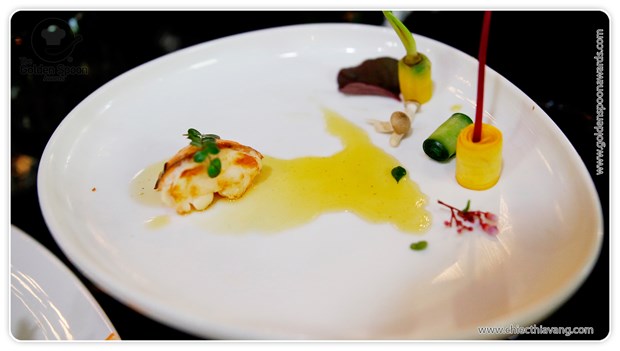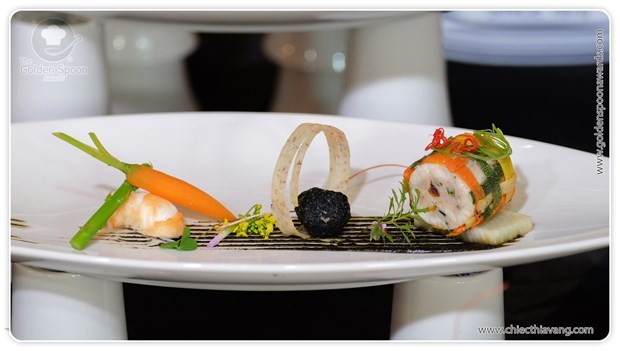South Semi final - Golen spoon contest 2015
“Cây sọ chó” taken from out of the wild and into the city
Wednesday, 10/28/2015 10:32
Perhaps if there isn’t this professional and big scale like the Golden Spoon contest then “cây sọ chó” would still be hidden in the jungle of Ba To Mountain; its life would be relegated to barbeques only.
An exciting moment happened on the first morning
of the semi-final round, Southern region in the 2015 Golden Spoon contest as
many curious eyes looked upon a strange tree. The leaves looked like “
cây cần thăng” – a kind of bonsai tree.
Its oil has the taste of mint but is a littlebitter. It has a pleasant and subtle aroma like a weaker version of
curry leaves. It also has the slight taste and smell of dried tangerine skin,
or as it is called here, “
trần bì”.

Leaves of “Cây sọ chó”
The first person who
discovered this tree on the shelf of the team No.30 (Van Thanh Tourist Area) is
Artisan Ms. Suong Thi Bui. When she discovered it she immediately sampled a
leaf, and was so enamored that she called other judges come and taste it
together. Mr. Sakal Phoeung, chairman of
Escoffier Vietnam Chef Association and Head chef of Sofitel Saigon Plaza is
also one of the food experts and a member of the judging panel, commented after
tasting such a small piece of the “lá sọ
chó” that it was, “really
excellent.” The other two judges Mr. Sang Huy Ly and Elite Actress Kim Xuan
were also excited.

The judges are wowed by new spices
Upon further inquiry, it
was revealed that Mr.Long Thanh Chiem, food expert and director of Binh Quoi
Tourist area, is the one who brought this tree to Ho Chi Minh City. Mr. Long
shared that the spice tree is called “sọ
chó”. This tree grows wildly in Ba To jungle and mountain, and should not
be confused with walnuts. Mr. Long spent such a long time to journey and find
the new spice. He discovered that local people crush it and use it for
seasoning on meat before grilling; it brings very good and unique aroma.
But at this national
contest this spice is used in more complicated steps: before cooking it is
sprinkled on the dish as the last step when the food is almost fully cooked,
giving a bold smell and flavor. Mr. Long was also passed the test with his
salted dish, or “sọ chó” leaves sauce
served with the dish. But the happiest thing to Mr. Long is that “sọ chó” tree is adapted and grown up
well to fit the culinary climate in Ho Chi Minh City.
In
the Golden Spoon contest, “sọ chó” leaves
should be served on grilled lobster with wild tamarind sauce. Even more
appealing is when the bud of this tree is served with dragon prawn, then the
dish is not only tasty but also looks spectacular and eye-catching.

Lobster grilled with “sọ chó” leaves served with wild tamarind sauce done by Van Thanh Tourist area
However, to experienced
and strict judges like Mr. Ly Sanh, food expert and president of Saigon
Professional Chef Association or Mrs. Van Thi Bach Tuyet, director of Ho Chi
Minh City Tourism Services, there are still valuable comments that help to
improve and maximize the potential of such spices to another level. For
example, the grilled lobster with “lá sọ
chó” and tamarind sauce done by Chef Trung Hoang Nguyen would have been
better if the chef didn’t let the sour flavor of the wild tamarind sauce
overpower the taste of the key spice. And the dragon prawn served with the
sauce made of “cây sọ chó” bud mixed
with salad and “lá sọ chó” served
with coconut root done by Chef Duy Anh Vo Le had a better combination. However
Mr.Sanh Ly still wasn’t satisfied and said that “it still doesn’t reach to
that level”. The experienced judges recommended that if he increased the flavor
of “lá sọ chó” a little bit more then
it would taste better.

The dragon prawn served with the sauce made of “cây sọ chó” bud and “lá sọ chó” served with coconut root.
With such comments, one
must remember that “cây sọ chó” has
just moved to Saigon like a wild animal out of the jungle and into the city.
This is also the first time it was presented at the Golden Spoon contest, so it
is normal to have growing pains and make minor mistakes. It will now be
available to more diners, especially in the South. And so “cây sọ chó” tree will have a chance to meet more diners who can
fall in love with it.
Tan
Trung